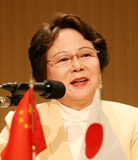��The Dawn of a Culture
�� the Manyoshu and Homer��
June 4, 2008
Ms. Atsuko Toyama,
President,
New National Theatre, Tokyo
 1. When was the Manyoshu compiled?
1. When was the Manyoshu compiled?
��It has been a thousand years since the Tale of Genji was written. But even 300��400 years before Genji, there were many poems (Waka) that had been exchanged each other in Japan. It was roughly 1,250 years ago that these were then compiled into the Manyoshu (Collection of Ten Thousand Leaves) by Otomo-no Yakamochi.
2. The Peculiarity and Charm of the Manyoshu
��The first poem in Volume I of the Manyoshu is a poem by the Emperor Yuryaku, who came to the throne in 456. The most recent poem is the one created by Otomo-no Yakamochi. In other words, the Manyoshu is a grand collection of poems that was made and read over a period of roughly 300 years.
��The important fact behind the root of the charm of the Manyoshu is the scriptural representation of poems that were created in an era when no script existed, and poems were instead passed on by spoken tradition. When the poems were first written down, they were inscribed with Chinese characters. At the dawn of culture, poems existed before there was script. Actually, there are many ethnic groups that do not have a writing system but there are no ethnic groups without poetry. In human history, poetry had more universality than script.
3. The Dawn of Classification in the World, Songs and Poetry
��The first record that exists in Greece is Homer��s Epic. It can be traced back from the 14th century B.C. to 12th century B.C. to the Mycenaean Period. Homer emerged in 8th century B.C., and his epic poems were transformed from songs to stories.
��It is not clear when the Iliad and Odyssey were first written down, but it has been said that it was in the 6th century B.C. when Peisistratos, the usurper of the throne of Classical Athens, had Homer��s epic poetry transcribed to papyrus. That Athenian version was widely diffused and Athens became the center of civilization.
��Following this, the three great tragic poets of Greece appeared, the historian Herodotus and philosophers such Socrates and Plato, and natural scientists such as Democritus followed, and Greek Civilization was born.
��The core of the Iliad and Odyssey was the story of the Trojan War. The remnants of Troy are located in present day Turkey. Turkey is a unique country that forms the bridge between the civilizations of the East and West. It was also the center of the Ottoman Empire. In Turkey, from the 19th through the 12th centuries B.C., the Hittite civilization flourished, and after it, Byzantine and the Ottoman Empire did the same. In this way the great epic poems of the Greek Era passed on to the Greco Roman Civilization, and the Epics of Turkish Anatolia became connected to the Islamic civilization. It can be said that the dawn of civilization begins with composition.
4. Transmission of Civilization
��Since the Renaissance, the European Civilization ruled the world. What made this possible was, when the Greco Roman Civilization was fading away, its culture and literature were translated into Arabic and passed on by the Islamic peoples. The Greco Roman Civilization was the foundation of the European Civilization.
5. Conclusion
��Numbers of centuries have passed and today civilization has matured, but a pronounced feature of modern society is the rapid advancement of IT technologies that have brought about the digitization of communication. People have come to rely on brief exchanges of code rather than exchanging words of beauty. With this, only dry, poor words starved of their substance are exchanged. Now more than ever we must recall the dawn of civilization, and we cannot forget the depth of wisdom and the joy of exploring the delightful exchange of words of beauty that has been created and passed on over time.